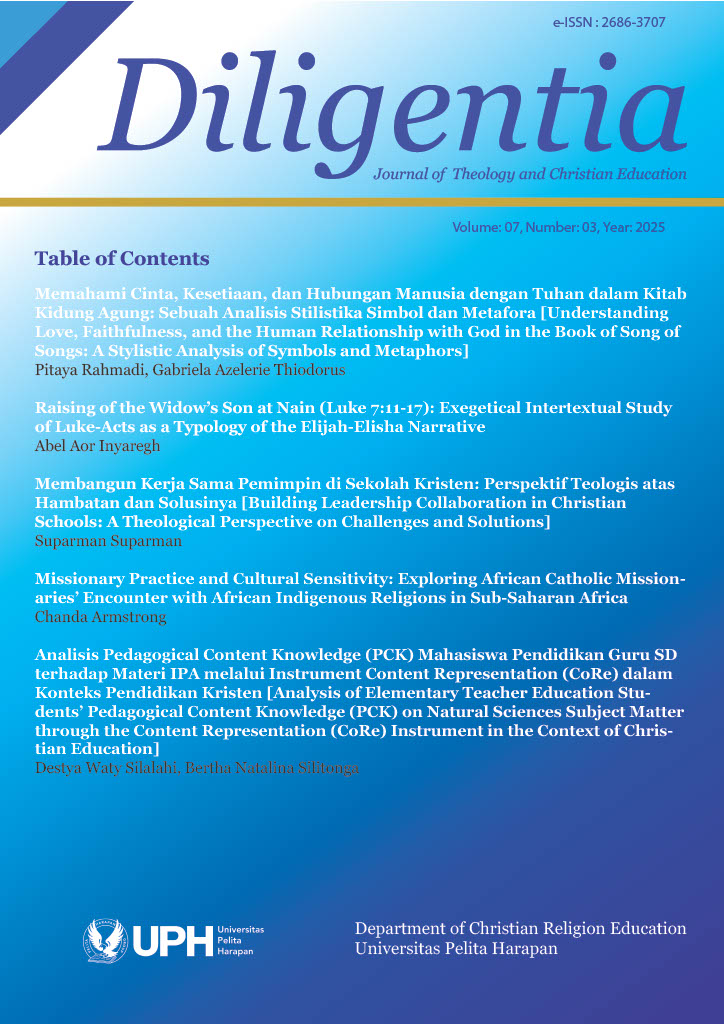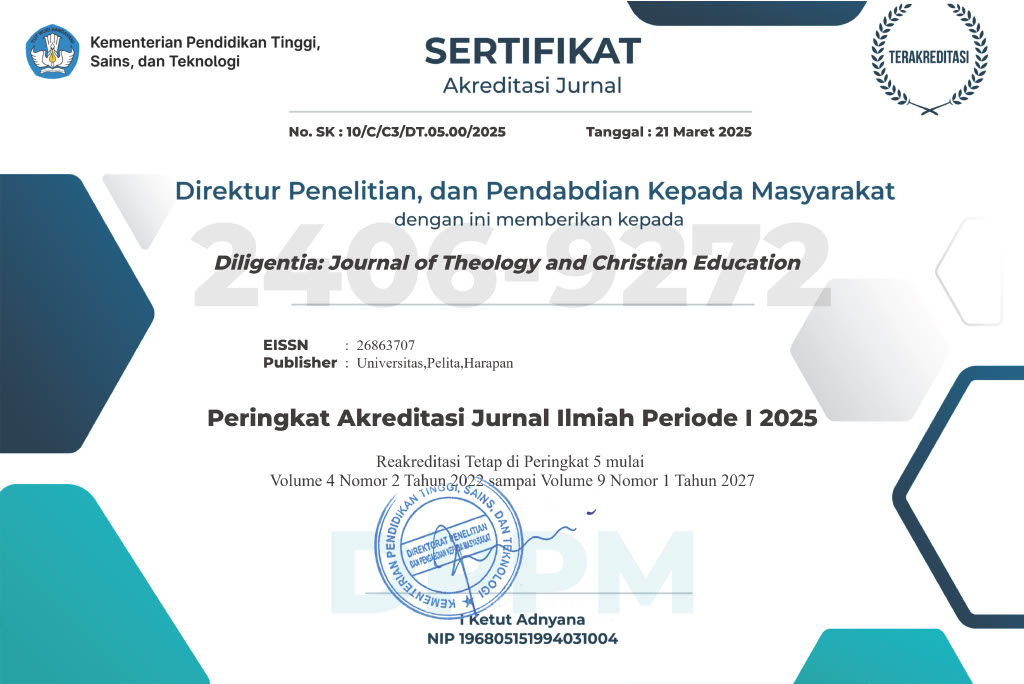Missionary Practice and Cultural Sensitivity: Exploring African Catholic Missionaries’ Encounter with African Indigenous Religions in Sub-Saharan Africa
DOI:
https://doi.org/10.19166/dil.v7i3.10239Schlagworte:
African Indigenous Religion, Cross-cultural Awareness, Cultural Sensitivity, Inculturation, African Missionaries, Interfaith DialogueAbstract
Early Western missionaries to Africa have been criticised for lacking cultural sensitivity to African indigenous religion(s) (AIR). This interpretive phenomenological study examines how the presence of Indigenous African Catholic missionaries in modern sub-Saharan Africa may have shifted the narrative of missionary encounters. It investigates how these missionaries navigate and experience cultural sensitivity within the context of their work. This study is based on the theoretical frameworks of inculturation and dialogue, informed by the Second Vatican Council’s focus on interreligious dialogue and Pope John Paul II’s advocacy for evangelising African cultures. Eight African missionaries from Western, Eastern, Central and Southern sub-Saharan Africa participated in this study, providing narrative data through semi-structured interviews. African missionaries have indicated both cultural sensitivity and insensitivity towards AIR, with some missionaries appreciating shared values and actively engaging in respectful interactions with AIR. However, challenges emerge in this interaction, including navigating cultural differences, syncretism, historical prejudices and theological dilemmas. Despite these challenges, indigenous missionaries are committed to inculturation and dialogue, incorporating certain indigenous practices into worship and developing culturally relevant pastoral approaches. The study recommends developing culturally sensitive evangelistic approaches that not only value and respect indigenous identities and spiritualities but also promote mutual understanding and social unity.
Literaturhinweise
Adamo, David T. “Christianity and the African Traditional Religion(s): The Postcolonial Round of Engagement.” Verbum et Ecclesia 32, no. 1 (October 2011): 1–10. https://doi.org/10.4102/ve.v32i1.285.
Asamoah-Gyadu, Johnson Kwabena. “Therapeutic Strategies in African Religions: Health, Herbal Medicines and Indigenous Christian Spirituality.” Studies in World Christianity 20, no. 1 (April 2014): 70–90. https://doi.org/10.3366/swc.2014.0072.
Doyle, Dennis M. “The Concept of Inculturation in Roman Catholicism: A Theological Consideration.” U.S. Catholic Historian 30, no. 1 (December 2012): 1–13. https://doi.org/10.1353/cht.2012.0000.
Fatokun, Samson Adetunji. “Christian Missions in South-Western Nigeria, and the Response of African Traditional Religion.” International Review of Mission 96, no. 380–381 (January 2007): 105–13. https://doi.org/10.1111/j.1758-6631.2007.tb00595.x.
Gundani, Paul H. “Views and Attitudes of Missionaries toward African Religion in Southern Africa during the Portuguese Era.” Religion and Theology 11, no. 3-4 (January 2004): 298–312. https://doi.org/10.1163/157430104x00140.
Hexham, Irving. Review of The Missionary and the Diviner: Contending Theologies of Christian and African Religions, by Michael C. Kirwen. The International Journal of African Historical Studies 21, no. 4 (1988): 707–08. https://doi.org/10.2307/219755.
Huber, Phillip C. Review of Christianity and African Culture: Conservative German Protestant Missionaries in Tanzania, 1900–1940, by Klaus Fiedler. Missiology an International Review 28, no. 1 (January 2000):109. https://doi.org/10.1177/009182960002800111.
Isiorhovoja, Osbert Uyovwieyovwe. “Understanding African Socio-Cultural Context: Contemporary Challenges to Christian Missions in the 21st Century.” East African Journal of Traditions, Culture and Religion 3, no. 2 (October 2021): 90–97. https://doi.org/10.37284/eajtcr.3.2.427.
Kolapo, Femi J. “CMS Niger Mission Agents’ Field Practice.” In Christian Missionary Engagement in Central Nigeria, 1857–1891: The Church Missionary Society’s All–African Mission on the Upper Niger, edited by Femi J. Kolapo, 85–132. Cham, Switzerland: Palgrave Macmillan, 2019. https://doi.org/10.1007/978-3-030-31426-2_3.
Mangayi, Lukwikilu Credo. “Conversions in Context: Insights from an Autobiographical Narrative of a Congolese-Born Missionary at Stinkwater.” Missionalia 45, no. 1 (September 2017): 77–91. https://doi.org/10.7832/45-1-185.
Marovic, Zana. “Cross-Cultural Indigenous Training: The South African Experience.” Culture & Psychology 26, no. 3 (February 2020): 605–21. https://doi.org/10.1177/1354067x20908529.
Mawere, Joshua, Ricky M. Mukonza, A. Hungwe, and Stewart Lee Kugara. ““Piercing the Veil into Beliefs”: Christians Metaphysical Realities vis-à-vis Realities on African Traditional Medicine.” African Journal of Religion Philosophy and Culture 2, no. 1 (June 2021): 77–99. https://doi.org/10.31920/2634-7644/2020/v2n1a5.
Missionaries of Africa. “Our Roots.” February 7, 2017. https://mafrome.org/about-us/origines/.
Mokhoathi, Joel. “Neo-Colonialism and the Emancipation of Indigenous Religions of Africa: Reconnoitring Reformist Possibilities.” Religions 15, no. 7 (July 2024): 1-12. https://doi.org/10.3390/rel15070872.
Mokhutso, Jacob. “Ancestors Are Demonic - Is It True? Traversing Christian Demonology and African Traditional Religion.” Pharos Journal of Theology 103, no. 2 (November 2022): 1–20. https://doi.org/10.46222/pharosjot.103.2046.
Mugovhani, Ndwamato George, and Madimabe Geoff Mapaya. “Towards Contestation of Perceptions, Distortions and Misrepresentations of Meanings, Functions and Performance Contexts in South African Indigenous Cultural Practices.” Mediterranean Journal of Social Sciences 5, no. 27 (December 2014): 1201–6. https://doi.org/10.5901/mjss.2014.v5n27p1201.
Pobee, John S. “Health, Healing and Religion: An African View.” International Review of Mission 90, no. 356-357 (March 2009): 55–64. https://doi.org/10.1111/j.1758-6631.2001.tb00260.x.
Sarfo, Francis Owusu. “Perspectives on the Challenges of Christianity and African Traditional Religion throughout the Ages to Contemporary Times.” Journal of Basic and Applied Research International 29, no. 6 (December 2023): 30–49. https://doi.org/10.56557/jobari/2023/v29i68576.
Szanajda, Andrew, and Yu Jie Li. “Missionaries Creativity in Nigeria: A Seed for the True Gospel of Christ on the African Continent.” International Journal of Humanities, Social Sciences and Education (January 2023): 140–54. https://doi.org/10.20431/2349-0381.1006013.
Tembo, Dorothy. “Protestant Missionaries’ Understanding of and Attitude toward African Religion in Colonial Malawi.” International Bulletin of Mission Research 46, no. 4 (June 2022): 555–63. https://doi.org/10.1177/23969393221098142.
The Holy See. “Faith and Inculturation.” The Roman Curia. Last modified 1988. https://www.vatican.va/roman_curia/congregations/cfaith/cti_documents/rc_cti_1988_fede-inculturazione_en.html.
Tugume, Lubowa Hassan. “Attitudes of Christian Missionaries towards African Traditional Religious Beliefs in East Africa during the British Colonial Rule.” African Journal of History and Culture 7, no. 10 (October 2015): 193–99. https://doi.org/10.5897/ajhc2015.0276.
Tushima, Cephas T. A. “The Ramifications of Missionary Proselytisation on Tiv Culture: Lessons for Contemporary Critical Biblical Contextualisation.” Verbum et Ecclesia 41, no. 1 (September 2020): 1–9. https://doi.org/10.4102/ve.v41i1.2061.
Uzukwu, Elochukwu. “The Clash and Continuity of Interpretation of Redemptive Suffering between African Religions and Christianity.” In Atonement and Comparative Theology: The Cross in Dialogue with Other Religions, edited by Catherine Cornille, 167–86. New York, NY: Fordham University Press, 2021. https://doi.org/10.1515/9780823294374-009.
Van Manen, Max. Researching Lived Experience: Human Science for an Action Sensitive Pedagogy. 2nd ed. London: Althouse Press, 1997.
Downloads
Veröffentlicht
Zitationsvorschlag
Ausgabe
Rubrik
Lizenz
Copyright (c) 2025 ARMSTRONG CHANDA

Dieses Werk steht unter der Lizenz Creative Commons Namensnennung - Weitergabe unter gleichen Bedingungen 4.0 International.
Authors who publish with this journal agree to the following terms:
1) Authors retain copyright and grant the journal right of first publication with the work simultaneously licensed under a Creative Commons Attribution License (CC-BY-SA 4.0) that allows others to share the work with an acknowledgement of the work's authorship and initial publication in this journal.
2) Authors are able to enter into separate, additional contractual arrangements for the non-exclusive distribution of the journal's published version of the work (e.g., post it to an institutional repository or publish it in a book), with an acknowledgement of its initial publication in this journal.
3) Authors are permitted and encouraged to post their work online (e.g., in institutional repositories or on their website). The final published PDF should be used and bibliographic details that credit the publication in this journal should be included














